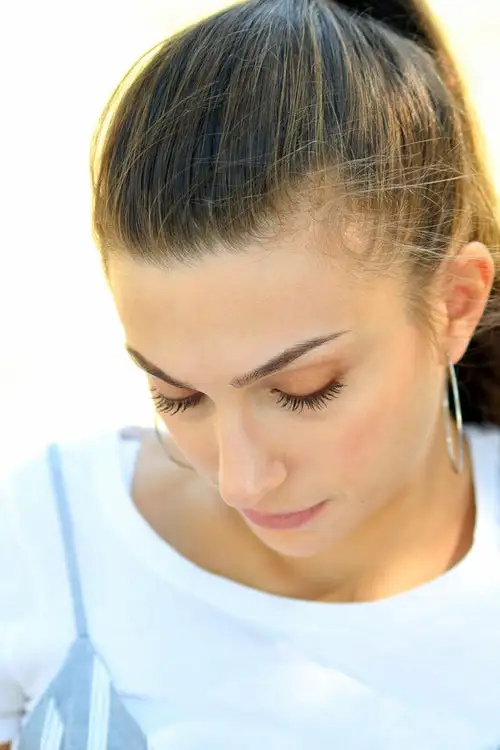Anyone who has Hashimoto’s knows that hair loss can be a big concern. I know it was for me. Right before my doctor diagnosed me with Hashimoto’s, I was losing a lot of hair. I would find large clumps of it in the shower. Each pass through my hair with the comb was a death sentence for my hair. Every day I’d look in the mirror and notice the skin on the sides of my forehead becoming more noticeable. It got to the point that I was afraid to comb my hair.
It didn’t dawn on me that my hair loss might be due to Hashimoto’s. Other warning signs pointed to Hashimoto’s, but I didn’t make the connection. I thought I was getting older and my body was not functioning optimally; when we get older our body’s slow down. Right?
Not necessarily. I’ve learned a lot since my diagnosis. I’ve spent many hours researching and educating myself on Hashimoto’s. I may not be a doctor, but I know enough now to be able to share my experience and any information I’ve learned about coping with Hashimoto’s.
Hair Loss and Hypothyroidism

I mentioned at the beginning of this blog my ignorance about the reason for my hair loss. I had many symptoms of hypothyroidism which I discuss in my blog “Let the Lesson Begin.” If you look at those symptoms, you will realize they are symptoms that could be related to many disorders and illnesses. Hair loss is one in the long list of symptoms.
Thyroid imbalance is the most common form of hormonal imbalance leading to hair loss. It is also the most under diagnosed hormonal disorder. Many people are diagnosed and treated for (let’s say) depression when they have a thyroid disorder. It’s scary but true.
When I was twenty-nine, my doctor diagnosed me with fibromyalgia. My symptoms were those that mirrored hypothyroidism. I didn’t know it at the time because my labs came back within the normal range for a thyroid condition. That statement brings me to my next one.
Confusion and Thyroid Labs

Conventionally recommended labs for thyroid ranges are too broad. Many doctors look at the lab, versus the symptoms and condition of the patient. The oversight causes many doctors to overlook a lot of thyroid-related symptoms.
Thyroid symptoms can be too high (hyperthyroid) or too low (hypothyroid). Hypothyroidism occurs when your thyroid is unable to process the thyroid hormone (T3 and T4) necessary for healthy functioning body systems.1 Often hypothyroidism is caused by Hashimoto’s which is an autoimmune condition. I go into more detail in my blog “Let the Thyroid Lesson Begin.” Hyperthyroidism is the overproduction of the thyroid hormones (T3 and T4). We will be focusing on hypothyroidism and Hashimoto’s for this post.
Keeping Your Hair With Hashimoto’s

Thyroid function affects every part of your body. We are talking about hair loss here, so we’ll leave other functions and symptoms for another post. Hair loss is one way your thyroid affects your hair. Hair loss usually follows earlier conditions such as brittle and dry hair. We are all familiar with the make-up of hair. Each strand of hair is made up of medulla, cortex, and cuticle. The root of the hair is lodged in a follicular involution of the epidermis or “follicle.”3 The hair follicle has a receptor site for the thyroid hormone, which binds to the receptor site. The thyroid hormone that resides within the receptor site is what turns on and off, normal hair growth. It doesn’t matter if it is insufficient or excess thyroid hormone production, the disruption will cause hair to shed.
Adequate T3 and T4 hormone cause the hair follicle cycle to last longer causing increased or healthy hair growth. The T3 and T4 hormone also encourage pigmentation of the hair. When T3 and T4 levels are inadequate, you see thinning all over the head or in some cases on the sides of the head. I experienced hair loss on the sides of my head along the temple area.
Complete Thyroid Testing Requires More Than the Thyroid Panel
If you are experiencing hair loss along with any of the symptoms of Hashimoto’s, you should check with your doctor. You should ask your doctor to test the following 2:
• Thyroid panel: TSH, Free T4, Free T3, Reverse T3, TPO Antibodies, Anti-TGB Antibodies.
• Vitamins and minerals – these are key in converting T4 (inactive) hormone to T3 (active hormone): Ferritin, vitamin D and B12 at the very least.
• Sugar levels: glucose (fasting blood sugar), HA1C and insulin.
• Lipid Panel: total cholesterol, LDL, HDL triglycerides.2
Part of having healthy hair is being healthy. The best way to accomplish good health is by changing your diet. I discuss diet in my blog “Healthy With Hashimoto’s”.” When we change our diet, we affect the symptoms of Hashimoto’s and begin to feel better.

Looking Good, Feeling Good
We live in a society that constantly reminds us of how important it is to look good. More importantly, we should feel good. Part of feeling good is having a healthy body and properly functioning body systems. If you have Hashimoto’s you know how difficult it is to focus on feeling good and looking good. When we lose our hair, our confidence is affected. When our confidence is affected, we feel worse and accomplish less.
If you are looking at your hair loss as a symptom of Hashimoto’s, I encourage you to look at all options available to help you return your body systems to normal. Talk to your doctor about natural alternatives to synthetic medications on the market. You may be surprised when you realize it is possible to control your symptoms naturally.
Resources
1. https://academic.oup.com/jcem/article/93/11/4381/26272732. 2.https://hormonesbalance.com/articles/what-thyroid-labs-to-ask-for-in- order-to-manage-your-thyroid-and-hashimotos-disease/ 3.https://en.wikipedia.org/wiki/Hair